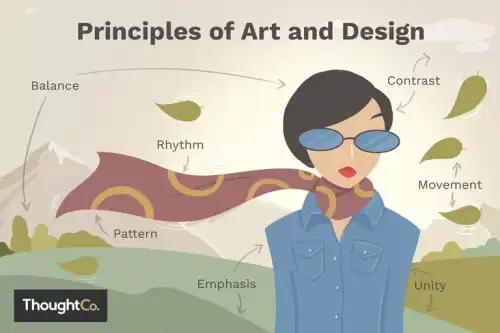Learn more about personaldevelopment with this collection
Conflict resolution
Motivating and inspiring others
Delegation
Understanding the elements and principles of art and design
The elements and principles of art and design are the foundation of the language we use when we speak about art.
- The elements of art are the visual tools an artist employs to create a composition: The elements are line, shape, colour, value, form, texture, and space.
- The principles of art define how the artist uses the elements of art to help show the artist's intent. The principles are balance, contrast, emphasis, movement, pattern, rhythm, and unity/variety.
338
1.83K reads
A successful painting
It is generally agreed that a successful painting consists of the following:
- It is unified
- It has some variety created by areas of contrast and emphasis
- It is visually balanced
- It guides the viewer's eye around the composition.
The principles of art are often interlaced, and one will frequently depend on the other. That means that one principle of art can influence the effect and impact of another.
290
1.07K reads
Principles of art: Balance
The visual elements of a composition should feel balanced and stable. Imbalance causes the viewer to feel disturbed.
Balance can be achieved in three ways:
- Symmetry, where both sides of the composition have the same elements in the same position, such as the two sides of a face.
- Asymmetry, where the composition is balanced by the contrast of any of the elements of art. For example, a large circle on one side might be balanced by a small square on the other side.
- Radial symmetry, where the elements are equally spaced around a central point.
292
751 reads
Principles of art: Contrast
Contrast is when each element of art in a composition is made stronger in relation to the other. When next to each other, contrasting elements are among the first places that the viewer's eye is drawn.
Examples of contrast:
- Negative/positive space.
- Complementary colours placed next to each other.
- Notan - light-dark harmony.
289
716 reads
Principles of art: Emphasis
It is mainly achieved through contrast.
A visually dominant area of the composition creates emphasis and commands the viewer's attention.
276
843 reads
Principles of art: Movement
It moves the viewer's eye around and inside the image.
A sense of movement can be created by diagonal or curvy lines, edges, the illusion of space, repetition, and energetic mark-making.
279
644 reads
Principles of art: Pattern
A pattern is a consistent repetition of any of the elements of art or any combination of it.
Some classic patterns are spirals, grids, weaves.
278
648 reads
Principles of art: Rhythm
Rhythm comes from movement implied through the elements of art in an organised but varied way.
While pattern demands consistency, rhythm relies on variety, similar to rhythm in music.
280
589 reads
Principles of art: Unity/variety
A painting will feel unified when all the elements fit together comfortably.
A painting needs both unity and variety. Too much unity makes it dull, and too much variety creates chaos. The best is to have areas of interest in your composition along with places for your eyes to rest.
283
630 reads
CURATED BY
More like this
2 ideas
The 8 Elements of Composition in Art
thoughtco.com
3 ideas
Interior Design Basics for Each Room of Your House
thespruce.com
11 ideas
Read & Learn
20x Faster
without
deepstash
with
deepstash
with
deepstash
Access to 200,000+ ideas
—
Access to the mobile app
—
Unlimited idea saving & library
—
—
Unlimited history
—
—
Unlimited listening to ideas
—
—
Downloading & offline access
—
—
Personalized recommendations
—
—
Supercharge your mind with one idea per day
Enter your email and spend 1 minute every day to learn something new.
I agree to receive email updates
